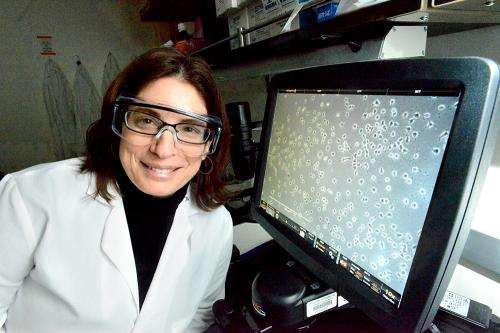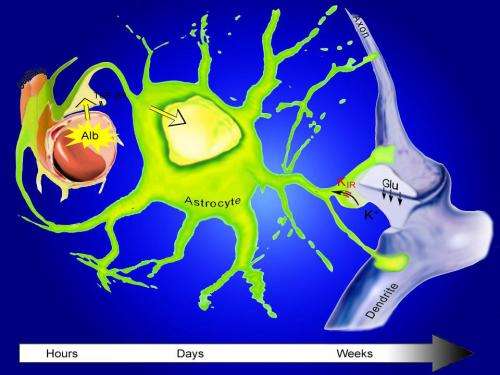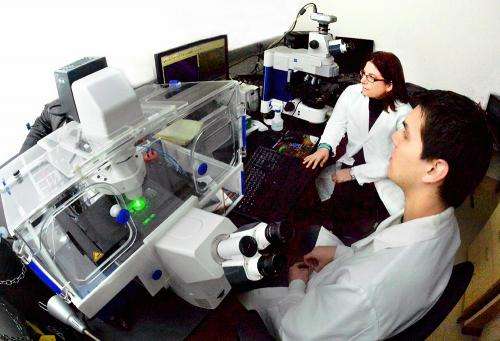Seizing control of brain seizures

(Medical Xpress)—A few years after serving in the Israeli army during the first Gulf War, Daniela Kaufer made a startling discovery about the effect of psychological stress on the brain. As a graduate student at the Hebrew University she showed that the kind of extreme stress experienced in combat can break down the physiological barriers that normally protect the brain.
She could not have known it then, but the finding would eventually lead her to uncover a key change in brain chemistry that triggers epileptic seizures. The Bakar Fellows Program is now helping her refine a strategy to block the threat and protect the brain from damage caused by physical trauma and other insults.
A physiological line of defense normally prevents circulating blood from entering the brain. Known as the blood-brain barrier, the tightly controlled system buffers the brain from exposure to bacteria and other blood-borne invaders. Kaufer's research has revealed how brain trauma can disrupt brain function once the barrier is breached.
In lab research as a postdoc at Stanford in 2002, Kaufer and her Israeli colleague Alon Friedman examined what happens in the brain when the barrier is compromised. They found that seizures were likely if – and only if – the brain came in contact with blood that had been circulating in the body.
They showed that a very common protein in blood called albumin accelerates signaling between neurons to abnormal levels. Neurons become overexcited and can cause seizures.
"We were surprised, even a little disappointed, that it was such a common component of the blood – nothing exotic at all – that led to epilepsy," recalls Kaufer, associate professor of integrative biology.

She and Friedman went to on to show that albumin interacts with a ubiquitous cell protein called TGF-Beta receptor to cause the damage.
In the healthy brain, TGF-Beta signaling affects activity of star-shaped sister cells of neurons called astrocytes, which normally limit neuron-to-neuron firing signals across the synapse. But when albumin stimulates TGF-Beta receptors, astrocytes lose some of their control. Neuron signaling spikes dangerously, and promotes the development of epileptic seizures.
"Researchers knew that following traumatic brain injury the risk of epilepsy was great, but they didn't know why," Kaufer says.
As luck would have it, a prescription drug for hypertension blocks TGF-Beta signaling. With support from the Bakar Fellows program, Kaufer is now carrying out research to confirm that blocking abnormal TGF-Beta activity can prevent epilepsy from a range of insults.
She expects that her and Friedman's lab research, coupled with clinical studies, will demonstrate the drug's ability to protect the brain and move it into use in emergency medicine to prevent victims of brain trauma from becoming epileptic.

Kaufer and Friedman's research is suggesting too that a number of assaults besides physical trauma – from brain infections to stroke – can also weaken the blood-brain barrier, and lead to the development of epilepsy through TGF-beta signaling. Emergency medicine physicians need only determine if the barrier has been breached to know if a patient is at risk for seizures.
Fortunately, the condition of the blood-brain barrier can be assessed using a safe and straightforward FDA-approved MRI protocol, so screening for epilepsy risk is within reach, says Kaufer.
"Right now, if someone comes to the emergency room with traumatic brain injury, they have a 10 to 50 percent chance of developing epilepsy. But you don't know which ones, nor do you have a way of preventing it. And epilepsy from brain injuries is the type most unresponsive to drugs.
"I'm very hopeful and that our research can spare these patients the added trauma of epilepsy."

















